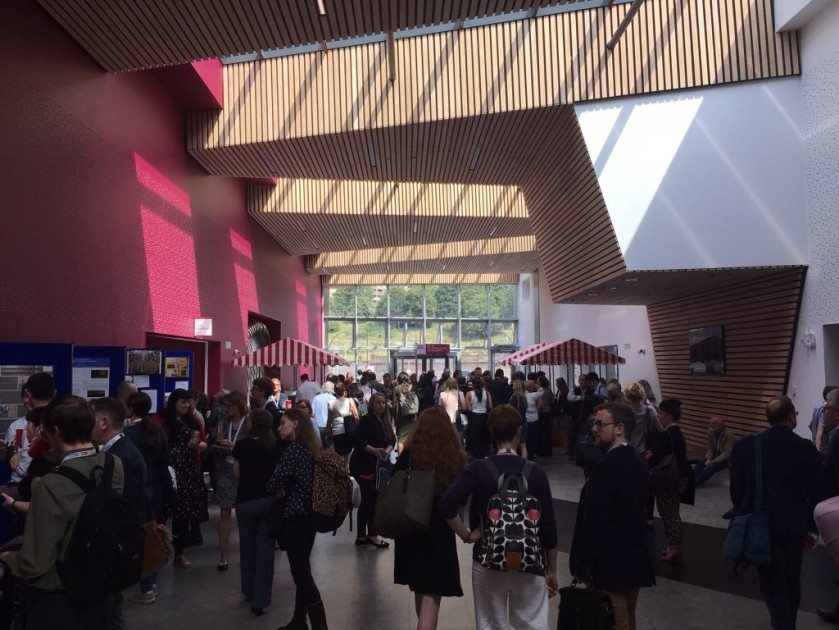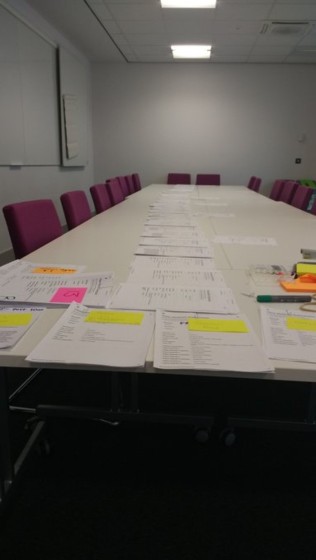

Dr Vicky Heap is a Senior Lecturer in Criminology and Fellow of the Sheffield Institute for Policy Studies at Sheffield Hallam University. Vicky conducts research and lectures in the areas of anti-social behaviour, crime prevention and research methods, and is Editor of Safer Communities journal.
We hosted the British Society of Criminology annual conference at Sheffield Hallam University in 2017. This blog reflects on my experience of leading the organising committee for the BSC’s annual showpiece, giving an insight into the ups and downs of the process – and debunking a few myths along the way.
It’s certainly not a myth that organising the BSC conference takes a LOT of work. However, there were some real high-points. The thing that stood out to me the most was the willingness of the criminological community to engage with the conference, at all levels of proceedings. We secured some amazing plenary speakers who, aside from doing the business when it came to their talks, were also particularly efficient at providing all the required admin information. This may seem like a minor point, but the small things make a big difference to an organisational process that has numerous component parts. Similarly, when putting together the Masterclasses, invited speakers were keen to be involved and were truly innovative in their approaches to the sessions. The same can be said for the presenters invited to participate in the Postgraduate Conference. In total, 11 external and 8 Sheffield Hallam speakers delivered the workshops and they were ably supported by the BSC Postgraduate Committee, who chaired all the sessions. The level of assistance and encouragement provided by the BSC was second to none, with plenty of questions answered by previous hosts, especially by the folks from Plymouth. Coupled with the incredible support from our events team and student helpers, we had a huge team invested in putting together the best possible conference. This administrative support and commitment was matched by the enthusiasm of both presenters and delegates. We welcomed 332 criminologists from 13 countries to Sheffield across the four days, and it was great to see so many people. It felt like a friendly conference too, evidenced by the 50+ criminologists from around the world partying together until 4am on the night of the conference dinner!

I can’t deny it, there was the odd personal perk associated with being part of the organising committee. I am probably one of the few academics that does not drink coffee, so when it came to planning the ACJS sponsored refreshments I asked the events team to see if we could provide something a little bit different. I love fizzy drinks, doughnuts, cookies, and generally anything that’s bad for you! Fortunately for me, our chef agreed to create a bespoke set of refreshments for that slot, which were served from market stalls alongside the postgraduate poster event. The ice-cold drinks went down well on what was a stiflingly hot day and my dream of a non-coffee-centred refreshment break came true!

On a more serious note, putting together the main conference programme was one of the most difficult tasks. First, we had to peer review the abstract submissions and we had a team of five people working on this between January and April and I can dispel this rumour once and for all: not all abstracts are accepted! Once we had our final set of panels and papers, we had to populate five parallel sessions across the three days of the main conference. Unlike other conferences which stipulate you must attend the whole event, the BSC conference affords a greater degree of flexibility by offering a range of delegate packages. This is where it gets tricky for the organisers, as we had to match up the programme to the registrations. Most delegates came to the whole conference, but there were high numbers of single day attendees too. On top of this, we received over fifty individual requests for specific time slots or times that had to be avoided because of things like transport constraints. We also had to think about spacing out the panel themes to avoid duplication, put single papers into appropriate panels (trickier than you’d think), and make sure there were a similar number of panels in each parallel session. It took me and Jaime Waters, who is the most logical-thinking and organised person I know, three long days, copious post-it notes and a massive table to finally piece the jigsaw together.

The issue of presentation slot requests relates to a major feature of the planning process that potential conference organisers should be prepared for; your email inbox will explode! This is from a combination of internal emails from your organising committee, events team, website administrator et al., as well as emails from external delegates. In the six to eight weeks leading up to the conference I was probably dealing with an average of 50-60 conference emails per day. The final aspect to be aware of as a would-be conference organiser is to expect the unexpected. As with any large-scale event, there is the potential for things to go wrong. There were a few hair-raising moments along the way, which I can look back on now with a wry smile. One scary instance came the day before the printing deadline for the conference handbook when we realised that for some unknown reason, the punctuation in the abstract submissions had not pulled-through from the online submission point into the conference handbook itself. This resulted in eight members of the events team hastily going through each abstract and inserting every comma, apostrophe and full-stop at break-neck speed. Another example of people going above and beyond to ensure the conference was delivered as planned.
Overall, leading the conference organising committee was an interesting and valuable experience on numerous levels. At least if my academic career doesn’t go according to plan I’ve now got the offer to go and work for our events team. So, if I mysteriously disappear after the next REF, you’ll know where to find me! There were a few stressful moments, but seeing the event run as we had envisaged was really rewarding as well as a massive relief. To witness the global criminological community come together to share their expertise and passion for our discipline made it all worth it. If you are thinking of putting a bid together to host a future conference – go for it! There will always be people willing to help you out and you can certainly count on my support.
Contact
Dr Vicky Heap, Sheffield Hallam University
Email: v.heap@shu.ac.uk
Twitter: @DrVickyHeap
Copyright free images: from author

You must be logged in to post a comment.